News
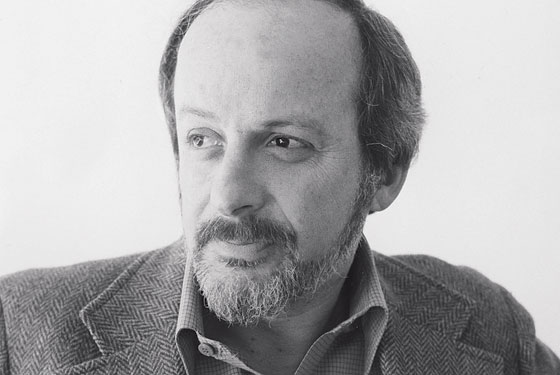
I had just finished my fiction workshop last week when I learned that Christopher Dorner, the former LAPD officer who was sought in connection with the murder and attempted murder of fellow officers, had been found. In Los Angeles that week, Dorner was the subject of intense debate, especially after the release of his manifesto, in which he alleged that the LAPD used excessive force during arrests and that he’d been fired when he reported it. Although the LAPD denied the use of excessive force, its claim was undermined by the fact that officers opened fire on a mother and daughter who were delivering newspapers, and on one man who was on his way to surf. Dorner was eventually found in a cabin in Big Bear, leading to a stand off during which he took his own life and/or was burned to death, depending on whom you believe.
The Dorner saga made me think about Coalhouse Walker, the pianist in E.L. Doctorow’s Ragtime. After a group of firemen vandalize his car, Walker seeks revenge by bombing fire stations in and around the town of New Rochelle. He sends letters to newspapers that read, “I want the fire chief turned over to my justice.” Like Dorner, Walker is the target of a statewide manhunt and a subject of curiosity and speculation.
It was widely reported when he was achieving his notoriety that Coalhouse Walker had never exhausted the peaceful and legal means of redress before taking the law in his own hands. This is not entirely true. He went to see three different attorneys recommended by Father. In all cases they refused to represent him. He was advised to recover his automobile before it was totally wrecked and to forget the matter. To all three he insisted that he didn’t want to forget the matter but to bring suit against the Fire Chief and men of the Emerald Isle Engine.
It is known too that Coalhouse made a preliminary attempt to see the matter through as his own counsel. He had filed a complaint but did not know how to go about getting a place on the court calendar or what steps had to be taken to assure that it was correct in form in order to be heard. He appeared at City Hall for an interview with the office of the County Clerk. It was suggested that he return another day when there was less pressing business in the office. But he persisted and was then told that his complaint was not on file and that several weeks would be required to trace it. Come back then, the clerk told him. Instead he went to the police station where he had originally filed and wrote out a second complaint. The policemen on duty regarded him with amazement. An older officer took him aside and confided to him that he was probably filing in vain since the volunteer fire companies were not municipal employees and therefore did not come under the jurisdiction of the city. The contemptuousness of this logic did not escape Coalhouse but he chose not to argue with it. He signed his complaint and left and heard laughter behind him as he walked out the door.
All this happened over a period of two to three weeks. Later, when the name Coalhouse Walker came to symbolize murder and arson, these earlier attempts to find redress no longer mattered. Even at this date we can’t condone the mayhem done in his cause but it is important to know the truth insofar as that is possible.
Perhaps Dorner will appear someday as a character in a novel. But, since this is Los Angeles, he’ll probably end up on film first.
Photo credit: Jerry Bauer.
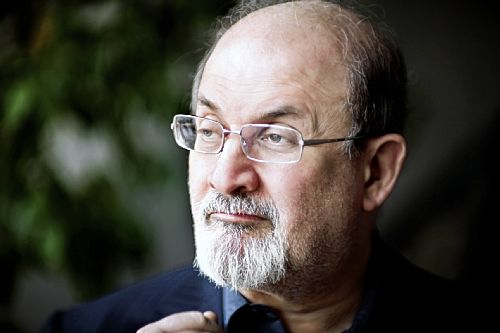
The latest issue of The Nation magazine includes an essay I wrote about Salman Rushdie’s Joseph Anton, his memoir of life during the years of the fatwa. More generally, this piece is about how society reacts to blasphemy and what those reactions tell us. Here’s how the essay starts:
The name Salman Rushdie and the word fatwa entered my vocabulary on the same February day in 1989. I was standing in the living room of my parents’ house in Morocco; my uncle, a newspaper rolled under one arm, had just arrived for dinner; my grandmother was sitting on the orange divan, her prayer beads wound on her right hand. Then someone pointed to the television screen and we all turned to look. Young men in the small British city of Bradford were burning copies of a book; the footage was interwoven with photographs of a hunched and dour-looking Khomeini. The ayatollah had found something offensive about a novel—wait, what was it called? Satanic something?—and had decreed that Muslims everywhere were duty-bound to kill its author.
Enter: Rushdie, fatwa.
As it happened, my entire family was Muslim. But to the ayatollah’s chagrin, no one rushed out to find the novelist. We ate dinner and talked about inflation and gas prices. I had grown up in a secular family, but as a teenager I had discovered religion and become a practicing Muslim. Of all those seated around our dinner table that night, the two who would have paid the most attention to a supposed insult against Islam were my grandmother and me. But my grandmother was illiterate and had wisely chosen not to form an opinion on something she had not read. And I loved books more than anything; I could not conceive of burning them.
You can read the rest here. And you can subscribe to the Nation magazine here.
(Photo credit: Syrie Moskowitz)
From Sigrid Nunez’s The Last of Her Kind, an exquisite novel about the friendship between two women, Georgette George and Ann Drayton, who meet at Barnard in 1968. This description really doesn’t do justice to the novel, which is about many, many things: class, race, idealisms of the mind and of the heart, identity. I admired, in particular, Nunez’s ability to maintain a consistent voice for the narrator, Georgette (or Georgie, or George, as she is known at different points in her life.) Here is a taste of it:
Where I came from. Upstate: a small town way up north, near the Canadian border. Jack Frost country, winter eight months of the year. Oh, those days before the globe had warmed, what winters we had then, what snows. Drifts halfway up the telephone poles, buried fences, buried cars, roofs caving in under all that weight. Moneyless. A world of failing factories and disappearing farms, where much of the best business went to bars. People drank and drank to keep their bodies warm, their brains numb.
The people. Given the sparseness of the population, you had to ask yourself, Why so many prone to violence? Many were related, true, and a lot more closely than you liked to think. Did inbreeding lead to viciousness? Alcoholism certainly did, and alcoholism was universal. Whole families drank themselves to disgrace, to criminal mischief, to early death. Here was a place where people seemed to be forever falling. And talk about secrets–more skeletons in the closets than in the cemeteries. Statistically not a high-crime area, but a world of everyday brutality: bar brawls, battered wives. And not every misdeed was perpetrated under the influence. I remember acts of violent cruelty even among children. Woe to the weak, the smaller kids, the animals (oh, the animals) that fell in those hands. And I remember blood feuds with roots going way back to before my grandparents’ time, feuds that left at least one in every generation maimed or dead. The savage world of the North Country poor. I do not exaggerate. The boy next door, a teenage giant with a speech defect so severe only his mother could understand him, hanged a litter of kittens from the branches of the Christmas tree.
And yet for all this, as I say, I was homesick when I went away to school.
I met Nunez at the Bread Loaf Writers’ Conference some years ago, when I was a fellow and she was on the faculty, but I’ve only now read this novel. A treat.

The end of the year is traditionally a time of retrospectives and resolutions, a ritual which I tend to resist, but with the end of my sabbatical and my imminent return to teaching, a bit of stock-taking seems inevitable. I was away from the University of California for a little over six months, which sounds like a very long leave of absence, but of course it went by in a blink. I’ve used the time to work on my new book, especially during my Lannan Foundation residency in Marfa, and I’m happy to report that I made significant progress. This novel is much longer than I anticipated when I started it three years ago and certainly the most ambitious project I’ve ever undertaken, but also the most pleasurable writing experience I’ve ever had.
This year, I also wrote a few other things here and there: a short piece for the New York Times on Ann Patchett’s State of Wonder; a review for The Nation of Percival Everett’s Assumption; an essay, also for The Nation, on Katherine Boo’s National Book Award-winning Behind the Beautiful Forevers; and contributions to the Guardian about the Arab revolutions; the Daily Beast on the rape of Amina Filali; The Nation on Islamophobia; and Newsweek on Los Angeles and a return to Morocco.
Most of the reading I’ve done in 2012 was related in some way to my novel, but I’ve also used the time to read for leisure: Joan Didion’s Run River, Leslie Marmon Silko’s Ceremony, and V.S. Naipaul’s Miguel Street were particular favorites. I read relatively few books published this year, but those that stand out were G. Willow Wilson’s Alif the Unseen, Zadie Smith’s NW, and Salman Rushdie’s Joseph Anton (about which I have an essay coming out soon.) I also read and admired Michael Gorra’s Portrait of a Novel, which tells the story of Henry James’s best-known work. This is not a traditional biography; instead, it shows us the writer at work on a single book: how he came to write it, how it relates to other books of the period, and how it was revised many years later.
I have no resolutions for 2013, save for the usual: to write, to read and learn, and to get better at what I do.
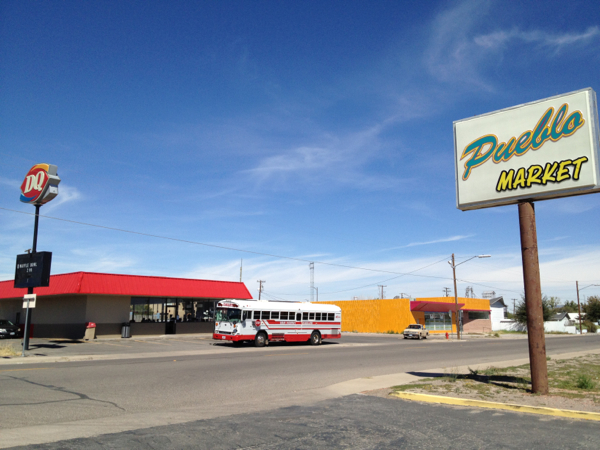
I have been back at home in Santa Monica for a few days now, but I feel as though I’m still under the spell of the magical time I spent in Marfa. I brought back a kind of energy that still surrounds and propels me, and I wonder if it has something to do with the size of the place. All my life, I’ve lived in big cities: Rabat, London, Los Angeles. But Marfa is a small town in west Texas, with a population of 2,100. Although the Lannan Foundation had graciously lent me a car for the duration of my stay, I walked everywhere I needed to go, whether to the post office, the bookstore or the farmer’s market. Everyone waved hello; everyone was friendly; everyone invited me to the Friday night football game; and everyone was a little mystified that writers go on these things called ‘residencies.’
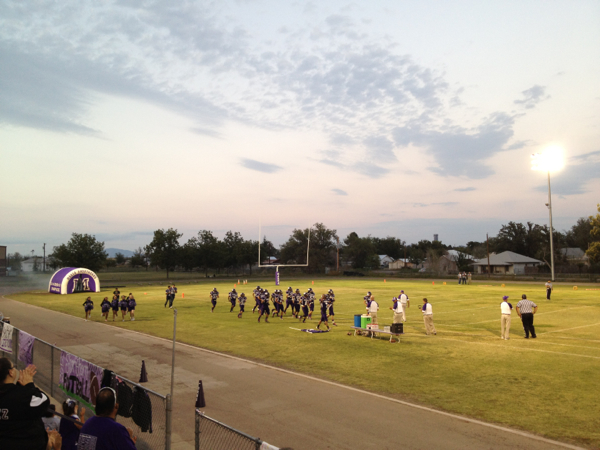
I did attend Marfa High School’s friday night game. There were only six players on each team, instead of eleven, but the stadium lights shone just as bright. Six-man football, I was told, was the only variant that could be played in such a small town. The Marfa Shorthorns did very well that night, beating the Sanderson Eagles with a score of 55-42. But I was no closer to understanding or even really enjoying the game. (Like all Moroccans, I remain a fan of good old football, played with a round black-and-white ball.) What I enjoyed instead was watching an entire community come together to cheer and support its children.
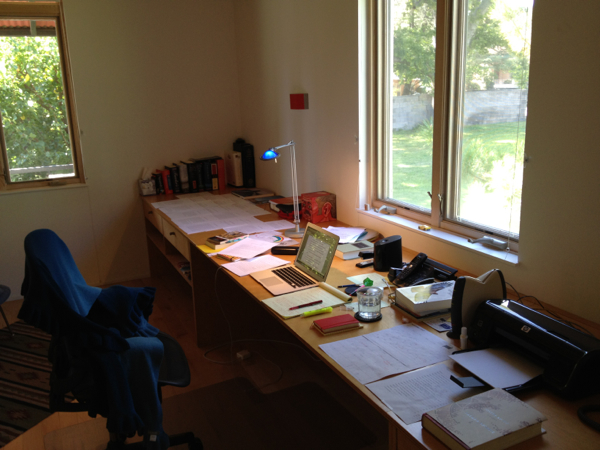
Above is a picture of my desk. This is where I spent the better part of my time last month, working on my novel. I listened to classical music—Brahms and Rachmaninov were favorites—but I did not mind the unusual sounds of an unfamiliar place. Freight trains, which run through the center of Marfa, blew their horns several times during the day. A murder of crows roosting on the tree in the front yard kept me company in the afternoon. There were also neighborhood dogs. None of them were tethered, and I had to overcome my fear of small canines whenever I stepped out. But I loved, especially, the wild and fearless turkey who visited me from time to time. Maybe it was all this unfamiliarity that gave birth to the energy I brought back with me to the metropolis.





